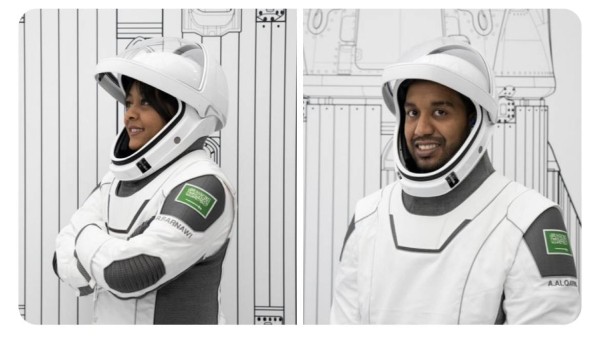Riyadh, Saudi Arabia -– Two Saudi astronauts will conduct 14 scientific and research experiments during their ongoing space mission.
The Kingdom’s first-ever astronauts Ali Al-Qarni and Rayyanah Barnawi, who is the first Muslim female astronaut, will engage in 11 research and scientific experiments within a microgravity environment at the International Space Station (ISS)
Additionally, they will participate in three interactive educational experiences with students in the kingdom, bringing the total number of experiments to 14. The focus will be on conducting human research, cell sciences, and cloud seeding experiments in the microgravity environment.
A team of researchers from the King Faisal Specialist Hospital and Research Centre, led by Dr. Khalid Abu Khabar, alongside Dr. Wijdan Al-Ahmadi and Dr. Adwar Hatti, in collaboration with the Saudi Space Commission (SSC), will oversee the cell science experiments. These experiments aim to deepen our understanding of how the inflammatory response changes in space, particularly regarding the lifespan of RNA.
In cooperation with the SSC, Dr. Ashraf Farhat from the King Fahd University of Petroleum and Minerals will supervise the cloud seeding experiment in microgravity. This experiment aims to simulate the cloud seeding process used in the Kingdom and other countries to enhance rainfall rates. The findings will aid scientists and researchers in developing new methods to create suitable living conditions for humans in space colonies on the Moon and Mars.
A team from Sadeem Company for Research and Development, led by Dr. Bader Shirah, in collaboration with the SSC, will oversee six experiments in the field of human research. These experiments will focus on understanding human adaptation during spaceflights, assessing their impact on the brain, and studying the effects on human health while in space.
Saudi male and female students will actively participate in scientific experiments conducted on the ISS. The goal is to enhance their understanding of space science and its potential to improve life on Earth. By comparing their experiments on Earth with those conducted by the Saudi crew aboard the ISS, students will have the opportunity for instant interaction.
The Ministry of Education, King Abdulaziz and his Companions Foundation for Giftedness and Creativity “Mawhiba,” Riyadh Schools, and Misk Schools are collaborating to facilitate this unified experience.
Intensive training
Saudi astronauts underwent an intensive special training program, to prepare for the flight, which included conducting 14 pioneering simulations in microgravity.
The training program for the Saudi astronauts included teaching them operational processes at the ISs and conducting several exercises in the Japanese and European research centers in January and February, in addition to training in exploratory skills at the headquarters of the “SpaceX” company in Hawthorne, California, the participants at the press conference said.
Who is Rayyanah Barnawi
Barnawi is a Saudi Arabian breast cancer researcher and scientist. Barnawi earned her undergraduate degree in Biomedical Sciences from the University of Otago, New Zealand, and has a master’s degree in biomedical sciences from Saudi Arabia.
With nine years of experience in breast cancer and stem-cell cancer research, she is an accomplished scientist who is making history with her upcoming mission.








